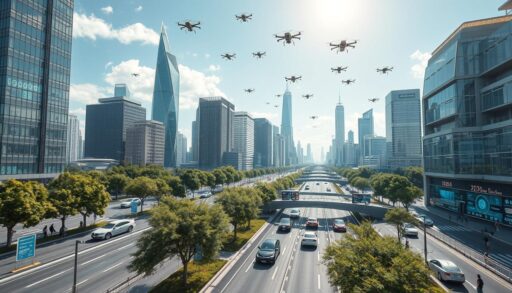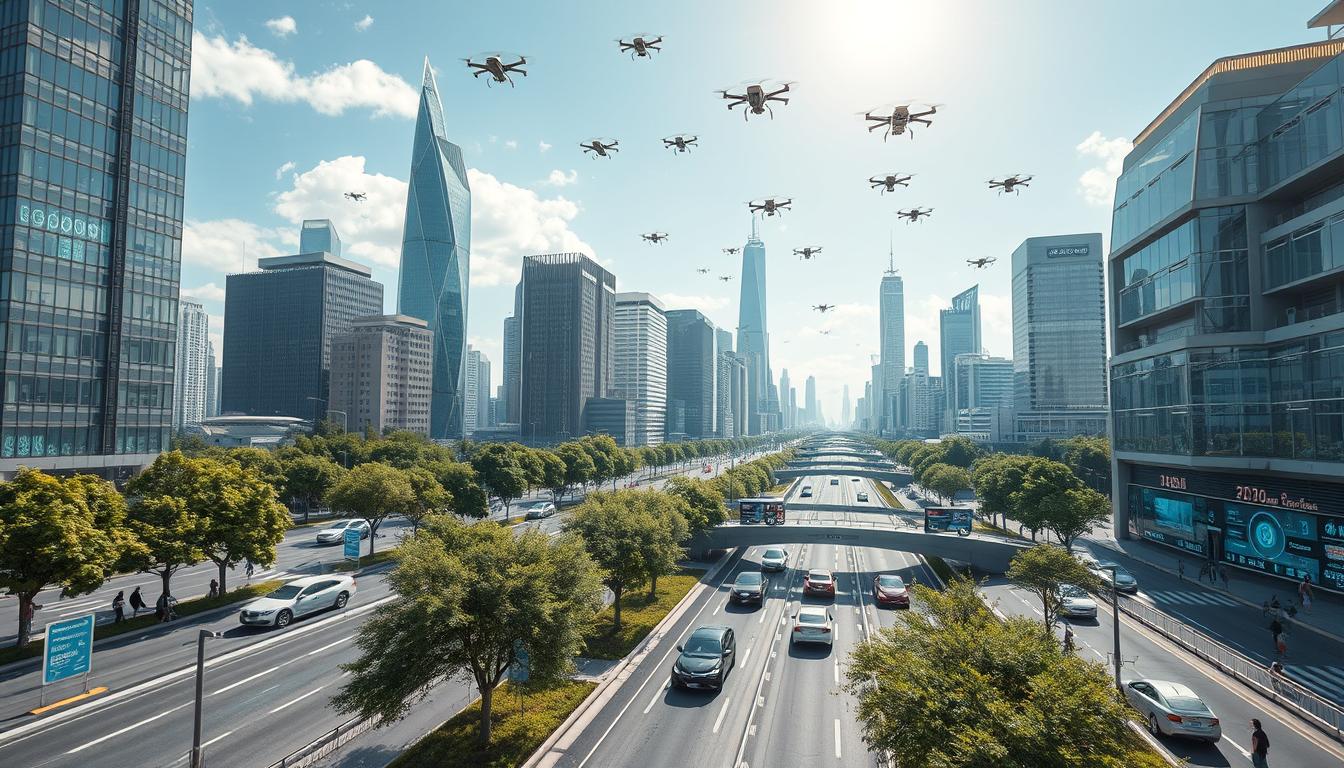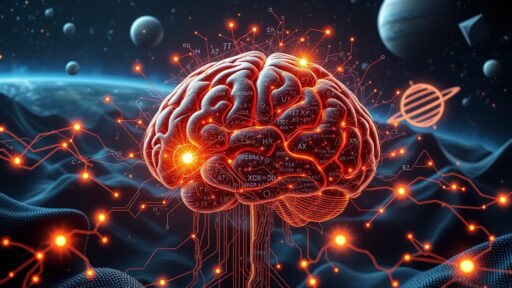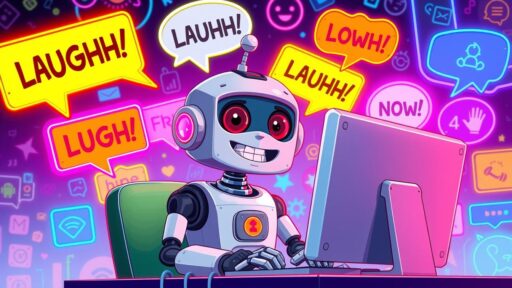Are you ready for a world where artificial intelligence changes everything? By 2030, AI will change many industries. This will bring both great chances and big challenges.
The fast growth of AI might make some feel lost. But don’t worry! I’m here to help you understand this AI future. In this world, humans and machines will work together to solve big problems and make our lives better.
In my vision of AI in 2030, we’ll see AI in healthcare, education, finance, and city planning. Imagine getting medical treatments made just for you, learning in ways that fit you, and living in smart cities that know what you need. The secret is to use this tech while keeping our human side.
Let’s see how we can make an AI future that helps us, not just replaces us.
Key Takeaways
- AI will be integrated across various industries by 2030
- Personalized healthcare and education will become the norm
- Smart cities will enhance public safety and efficiency
- AI will augment human capabilities, not replace them
- Ethical considerations will be crucial in AI development
- AI innovation will drive economic growth and job creation
The Evolution of AI: From AlphaGo to 2030
I’ve seen amazing changes in AI since AlphaGo beat Lee Sedol in 2016. This event changed AI forever, starting a new wave of progress. It’s changing our world in big ways.
Milestones in AI Development
AI has changed a lot. DeepMind’s AlphaFold project changed how we predict protein folding. GPT-3 showed us how AI can understand language like never before. These steps show what AI might do by 2030.
The Role of Deep Learning
Deep learning is key to AI’s fast growth. It can handle lots of data and find complex patterns. The future of deep learning looks very promising, with many uses in different fields.
Data Proliferation and Its Impact
More data means AI can learn and get better faster. This data-rich world is key for AI to keep improving. It helps AI learn new things.
- AI is expected to create $15.7 trillion in economic value by 2030
- User interface improvements are making AI more accessible
- Laws and regulations are shaping AI development
As we get closer to 2030, I’m looking forward to seeing how AI will evolve. The path from AlphaGo to the AI of tomorrow will be filled with exciting discoveries and innovations.
Artificial Intelligence 2030: Transforming Industries
I see a future where AI changes everything. By 2030, cognitive computing will change industries in ways we can’t imagine. AI could add $15.7 trillion to the global GDP, experts say.
- Healthcare: AI will make medicine more personal, find drugs faster, and diagnose better
- Transportation: Self-driving cars will change how we travel
- Education: AI tutors will offer learning plans for all ages
- Financial services: AI will spot fraud and give personal advice
Humanoid robots are also exciting. Over 100,000 will work in real places by 2030. With generative AI, they’ll do more complex jobs in many fields.
But, this fast change makes some people worried. They fear job losses and machines taking over. Yet, 63% of tech experts think AI will make our future better. With the right planning and ethics, AI in 2030 can make our lives better in many ways.
AI-Driven Healthcare Revolution
I’m excited about the future of healthcare. AI is changing how we treat patients. By 2030, technology will help us diagnose and prevent diseases better than ever.
Personalized Medicine and AI Diagnostics
AI is making personalized medicine a reality. Soon, treatments will be made just for you. AI can spot tumors better than doctors, leading to early and accurate diagnoses.
Drug Discovery and Development
AI is speeding up the creation of new medicines. It looks through huge amounts of data to find promising drugs. This could lead to new treatments for diseases that have been hard to solve.
AI in Medical Research
AI is changing medical research. It helps scientists understand complex data quickly. This could lead to big discoveries and a better understanding of health.
But, there are still challenges. The healthcare world will need 18 million more workers by 2030. AI can help by doing routine tasks. I think AI will be key in healthcare by 2030, making care better and more accessible.
The Future of Work: AI and Employment
I’ve been thinking about the future job market, and it’s clear that AI and employment are intertwined. Workforce automation is changing our economy fast. By 2030, AI could add a huge $13 trillion to global economic activity. That’s a lot!
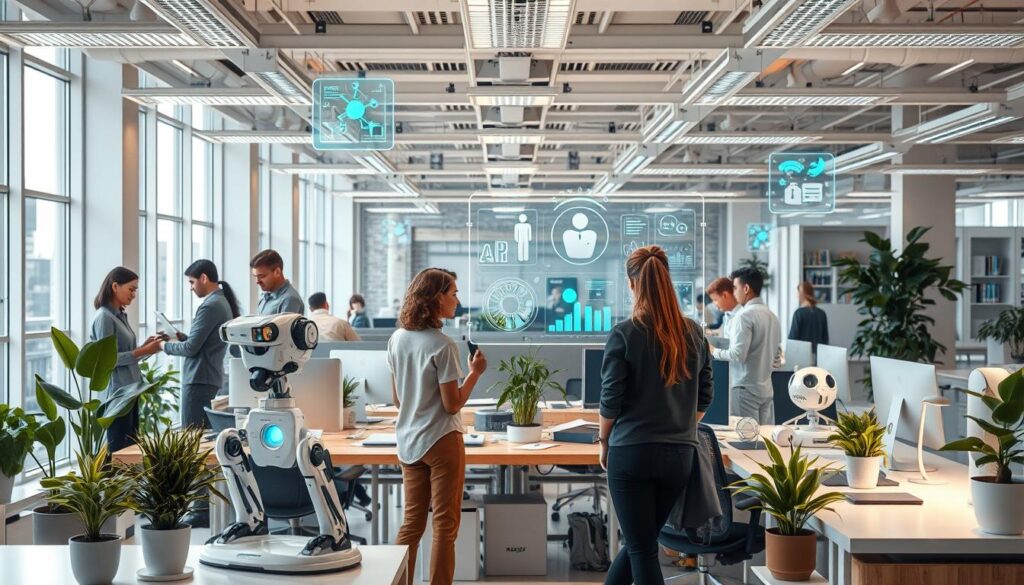
Despite fears of job losses, I’m optimistic about the future. AI might replace some jobs, but it’s also creating new ones. Did you know that 70% of companies are expected to use AI by 2030? This shift will lead to exciting new roles we can’t even imagine yet.
Here’s what I see happening:
- AI will handle routine tasks, freeing us for more creative work
- We’ll need to adapt our skills to work alongside AI
- New jobs will emerge in AI development and maintenance
Yes, change can be scary. About 14% of us might need to switch careers by 2030. But I see this as a chance for growth. We’ll become more versatile, learning to leverage AI in our work.
The future job market isn’t about humans vs. AI. It’s about finding the sweet spot where we complement each other. By embracing this change, we can create a more productive and fulfilling work environment for everyone.
AI in Education: Personalizing Learning Experiences
I’m amazed by AI’s power in education. By 2030, AI tutors and adaptive learning will change classrooms and online courses. They will help with the teacher shortage and create new jobs in education.
AI Tutors and Adaptive Learning
Platforms like ALEKS are leading the way in personalized learning. They make learning paths for students in math and chemistry. AI adjusts lessons based on how well students do, helping them learn at their own pace.
Breaking Language Barriers in Education
Apps like Duolingo use AI for language lessons. They offer lessons and exercises tailored to each student. Soon, kids who don’t speak dominant languages will have better learning chances, helping global research teams work together.
Lifelong Learning with AI
AI is changing education beyond school. Platforms like Coursera and Khan Academy suggest courses based on what you’re interested in. This helps adults keep up in a fast-changing job market. AI can help close the $1.6 trillion skills gap in the U.S. workforce.
- Global AI in education market projected to reach $80 billion by 2030
- Worldwide eLearning market forecasted to grow to $1 trillion by 2032
- AI estimated to create 12 million more jobs than it replaces by 2030
As we get closer to 2030, I’m looking forward to AI’s impact on education. It will make learning more accessible, fun, and effective for all.
Smart Cities and Infrastructure in 2030
I see cities in 2030 as amazing places. They will use AI and smart tech to make life better for everyone. These cities will be efficient and green.
By 2030, AI will change how cities work. Smart cameras with AI will keep us safe by spotting crimes fast. AI will also make traffic flow better, making our rides smoother.
These changes will also help the planet. AI could lower global emissions by at least 4%. AI drones will help farmers grow more food with less water and fertilizer.
Smart buildings will be key in these cities. They will use less energy thanks to IoT and AI. Solar and wind power will light up these cities, making them greener.
Public services will also get a big boost. AI will make healthcare, education, and security better for everyone. People will vote online and get services they need easily.
- ChatGPT reached 100 million users in just two months
- AI can predict and prevent air quality issues
- South Korea uses AI drones for agricultural monitoring
- Cities like Singapore and Dubai lead in smart urban development
As we get closer to 2030, AI, IoT, and 5G will make cities better. Our cities will be smart and meet our needs. The future of cities is bright and AI-driven.
AI-Enhanced Financial Services
I’m amazed by how AI in finance is changing the game. Banks and investment firms are using automated services to make things better. They’re seeing big savings and faster customer service.
Banking and Investment Revolution
AI is changing how banks and investments work. A big bank in Asia says AI handles 40% of its needs. This lets them keep up with the market and make better choices.
By 2035, I think every finance job in Germany will use AI. It’s a big change.
Fraud Detection and Risk Management
AI is making fraud detection better. It uses smart algorithms to spot suspicious activity. This makes transactions safer.
AI can find problems in real-time. It’s key as we go more digital.
Personalized Financial Advice
AI is making financial advice better. Banks can now offer services that fit you. Chatbots and AI assistants give quick, personal advice.
This trend will keep growing. AI will help create financial plans just for you.
But, there are still hurdles. Over 65% of banks face issues with data access. This slows down AI adoption. As we approach 2030, solving these problems is key for AI’s growth in finance.
The Ethical Implications of Advanced AI
AI is getting smarter fast, and we face big ethical questions. The fast growth of AI brings both good and bad. Now, making sure AI is used right is a big deal in tech.
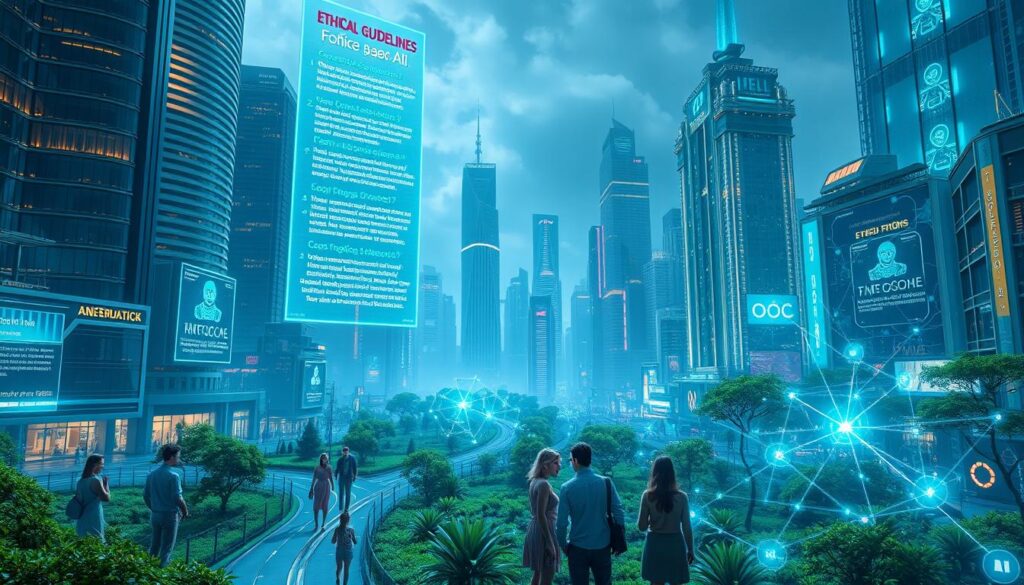
A study by Pew Research Center and Elon University found some scary facts. Out of 602 tech leaders, 68% think most AI won’t help the public by 2030. This shows we really need strong rules for AI.
AI’s ethics are a big deal. We worry about AI being unfair, invading privacy, and being used badly. Also, a few big groups might control all AI. These problems show why we must make AI right.
- Bias in AI algorithms
- Privacy concerns
- Potential for misuse
- Concentration of AI power
But, I’m still hopeful about AI’s future. Many are trying to make AI ethical and find solutions. We must keep working to make sure AI helps everyone.
AI and Human Augmentation: A Symbiotic Future
I see a future where humans and AI work together. By 2030, AI will make us better, not replace us. This partnership will bring big changes in many areas, like health and science.
Enhancing Human Capabilities
AI will soon be a big help to us. It will make us smarter by exploring data and designs. In health, AI will help find new treatments. Scientists will use AI to predict weather better.
The Importance of Emotional Intelligence
As AI does routine jobs, our special skills will matter more. Skills like empathy and creativity will be key in education and customer service. Young people will work on making AI fair and ethical.
Balancing AI Efficiency with Human Creativity
Finding the right mix between AI and human creativity is key. Schools will teach skills AI can’t do. This partnership will lead to a better, fairer world for all.
By working together with AI, we can make a future that’s better for us. It’s a chance to make technology serve us, not the other way around. I’m excited to see what the next years will bring.
Conclusion: Shaping Our AI-Powered Future
Thinking about the future of AI, I see big changes coming. The AI100 2021 Study Panel Report shows governments are starting to see AI’s value. This is key as we face both challenges and chances.
AI is already changing our world. With 42% of big companies using AI, we’re seeing big changes. In healthcare and finance, AI is making things better. But, we must fix the AI skills gap and deal with biases in tech.
By 2030, I hope AI will help people more than just machines. We need to keep investing and talk openly about AI’s good and bad sides. By teaching AI in schools and talking about it, we can make a future powered by AI that helps everyone.
Source Links
- AI-2030 : A Glimpse of AI’s future
- AI in 2030: Broad Impacts and Specific Solutions for a Better World
- LectureAI
- A Very Short History Of Artificial Intelligence (AI)
- 5 AI Predictions For The Year 2030
- How Will Artificial Intelligence Transform The World By 2030 – Fingent
- The potential for artificial intelligence in healthcare
- Artificial intelligence in healthcare: transforming the practice of medicine
- You would have been living under a rock if you did not know how artificial intelligence is set to affect jobs in 2024-2030. AI like ChatGPT seems to be stealing all of the headlines at the moment, Google unveiled new AI software to build presentations, analyze and enter data, and write content, and
- Generative AI and the future of work in America
- The Ultimate Guide to AI in Education: 4 Ways AI Can Deepen Learning and Drive Efficiencies – Video Assessment For Skill Development & Feedback | GoReact
- Top Ways AI in Education is Transforming the Industry
- From Fiction to Fact: How Artificial Intelligence is Shaping Smart Cities – BI4ALL
- The Future of Smart Cities: A 2030 Vision for Urban Evolution
- Unlocking the future of banking: the transformative power of generative AI
- AI in Finance: How Artificial Intelligence is Changing the Industry
- Experts Doubt Ethical AI Design Will Be Broadly Adopted as the Norm Within the Next Decade
- Survey XII: What Is the Future of Ethical AI Design? | Imagining the Internet
- 3. Improvements ahead: How humans and AI might evolve together in the next decade
- Life in 2100 According to the Most Powerful AI Model Today
- Conclusions
- The Future of AI: How AI Is Changing the World | Built In
- Can AI Scaling Continue Through 2030?
